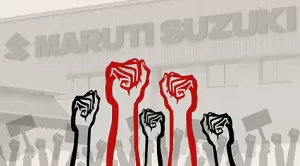The Public Sector in the time of Neoliberalism
ITI was India’s first public-sector undertaking (PSU) established in 1948 as Indian Telephone Industries Ltd. Like other PSUs, the ITI has suffered serious economic crises since the move towards market liberalisation in India, which began in the late 1980s and was consolidated through the 1990s. With the economic reforms of 1991, the company lost its monopoly status. With the deregulation conducted in the guise of delivering free competition, ITI, which already faced issues with lack of resources, found itself in clear disadvantage over its private-owned counterparts, and saw a detrimental lack of demand. Caught up in this crisis, the workers of ITI suffered manifold. Year-round work was not guaranteed, unions were being de-legitimised, and work was becoming increasingly precarious despite occasional salary incentives. Sociologist Dilip Subramaniam notes, “[I]f the ‘need of the hour’ called perhaps for ‘sacrifices’, to make such demands on workers alone would have been both impossible and fundamentally unjust, once the management and officers had pocketed the generous increases handed out by the government.”
Another tenet implicit (sometimes explicit) in the ideology of neoliberalism is a promise of a diverse and pluricultural modernity, which is free of caste hierarchy, racial dominance and gender inequality—all of which the free market will, supposedly, confine to the dustbins of tradition. That this couldn’t be farther from the truth has been confirmed by experiences across India and beyond, where caste dominance is still central to the allocation of certain kinds of occupations; women still suffer from misogyny, gender pay gaps in the workplace and dominance at home; and gender minorities continue to be violently persecuted. The case of the ITI further confirms this. Majority of the sweepers at ITI have historically been from SC/ST communities, and one in five people from the SC/ST communities work as sweepers. Practices of explicit casteism and untouchability have also been observed in the premises. Of the eighty workers who have been protesting their termination, thirty-eight belong to SC/ST communities. Despite reservations in the public sector, there was still meagre scope for social mobility for Dalits, which was further weakened by the increasing contractualization of labour.
Background and Present Context
The events leading to the unionisation efforts by the workers of ITI and their termination are best summed up in a fact-finding report prepared by the ITI Solidarity Group, consisting of academics, lawyers and members of civil society. In June 2020, several contract workers of ITI joined the Karnataka General Labour Union, affiliated to the All India Central Council of Trade Unions. In July 2020, 240 out of 400 contractual workers were laid off and wages of contractual workers were reduced without any consultation. Oddly enough, the next month, ITI called for a tender to hire contract workers. In September 2020, two ITI workers who had shown solidarity to the farmers’ protest in Delhi’s borders, which was then going on in full swing, were terminated from work.
In October 2021, reacting to a complaint filed earlier by worker support groups on the lay-offs, the Regional Labour Commissioner advised that under Section 33 of the Industrial Disputes Act, 1947, ITI should not change the conditions of service of the contract workers concerned with the dispute (regarding the lay-offs mentioned above). Yet, on 1 December 2021, eighty workers were not allowed to enter the premises of ITI and were told that they were terminated because the previous contractor, Pujaya Ltd., had been replaced by Sai Communications.
Contractualisation directly marginalises workers, enabling their super-exploitation, in a way much more brutal and precarious than permanent workers. As a worker at the protest said, “We have the officers’ union and the non-officers’ union for permanent workers. Only we casual workers didn’t have a union. The permanent workers have a separate canteen from us. They have access to crèches, ITI hospitals and other facilities. Not us.” Permanent workers sometimes even threatened the contract workers and asked them to refrain from forming a union.
The union is not only a device to collectively make economic demands but also a means for the contract workers to assert against caste discrimination. R. Krishna, who had been a technical assistant and operator at ITI since 2015, says, “Earlier, they made us face all kinds of harassment, caste discrimination and denied us canteen facilities. By forming the union, we have taken our rights and respect.”
At the sit-in protest site outside the gates of ITI, sheltered by a tent, the workers commemorated the death of BR Ambedkar on 6 December by lighting candles. They also celebrated the birth anniversary of Kannada poet Kuvempu. Various other organisations and individuals, including the BBMP Pourakarmika Sangha—a union of sanitation workers, whose members also continually experience the brunt of exploitation—and Kannada poet D. Saraswathi has also visited the protest site in solidarity.
Talks with the management have led to court hearings, but have concluded to no avail.
The Struggle after Eleven Months
Muniyamma worked for ITI for a decade. It greatly disappointed her that after all the years she gave to the company, they didn’t hesitate to terminate the middle-aged woman overnight. This is a sentiment shared by many of the workers, who had worked for a period of ten to thirty years, while some had even been associated with ITI for generations, with their parents having worked for the company in the past.
Viji, who is over fifty years of age and had worked for ITI since 1998, took us down her memory lane. Viji met the person who would later become her husband in the ITI colony when he played sports with her brother. Memories turn to resentment. One day, when she finished her day’s work and asked the manager what she could do next, he told her to go home and await future projects. On her way home, she got a call from the management and was told not to report to work from the next day. She had been out of work since 2020 and didn’t hesitate to join the union when she found out about the ongoing struggle of the workers laid off en masse.
Having an SSLC certificate, Viji did coil welding for seven years, classified as highly skilled work. Yet, one day, she found her name shifted from skilled to semi-skilled. A similar trick was played with multiple other workers. This helps the company devalue their labour, pay them less and ultimately fire them. The ambiguous lines between skilled and unskilled work and the farcity of the neoliberal construction of these categories were well understood by the workers of ITI from their intuitive everyday experience.
Viji’s daughter too worked for ITI for a few months in the HR department. She had to leave as she didn’t speak Hindi very well, something the managers had begun looking for in workers. Since then, much of the recruitment has been of Hindi-speaking workers, although the reporters of this piece weren’t able to ascertain the reason for this.
The eleven-month ongoing protest has been a challenge to sustain. Since the workers have been laid off, finances are difficult. Hema, who worked at ITI as a personal secretary for five years, had to pay her fourteen-year-old son’s school fees by the end of June 2022. With her husband being the only earning member in the family and with most of his earnings spent on their house rent, the family has been dependent on loans, with no means in sight to repay them with interest. Muniyamma, meanwhile, hasn’t been able to get loans from anywhere. Neither does she have any property or jewellery that could be sold or pawned to tide her through. Her husband has passed away, her daughter is married, and her son is studying PUC. The families and well-wishers of the workers have started to grow weary, and some have advised them to look for other jobs. However, many workers feel that they might be too old to be hired elsewhere.
Young Hemanth, branch president of Karnataka General Labour Union and a contract worker himself, did think about finding other work. However, Hemanth chooses to stay and lead the protests because he feels responsible for his comrades. He has seen the difficulties of each of the workers in the protest from up close. “Workers have taken loans to manage a lot of expenses, some of the workers’ families were admitted to the hospital, some family members passed away and they didn’t have money to bury them,” he says.
Many of the protesting workers have built camaraderie with their fellow employees during the course of the protests, finding strength and inspiration from one another. “Other ITI workers involved in the protest have been of great strength to me. AICCTU has also given us strength and support,” says Hema.
“Comrades have been my source of support. They are my right hand,” says Muniyamma. “I have difficulties arranging food at home, so I have food at the protest tent. Pourakarmikas were of great help with arranging for food, especially in the beginning days of our protest.” Staying home can be depressing, Muniyamma says. She feels content when she arrives at the tent, in the company of her fellow workers.
(Suryashekhar Biswas is a researcher and independent journalist, based in Bengaluru. Sachi is a social activist and trade unionist, based in Bengaluru. She is currently an intern with Confluence Media. Courtesy: The authors and https://bevaru.maraa.in.)




